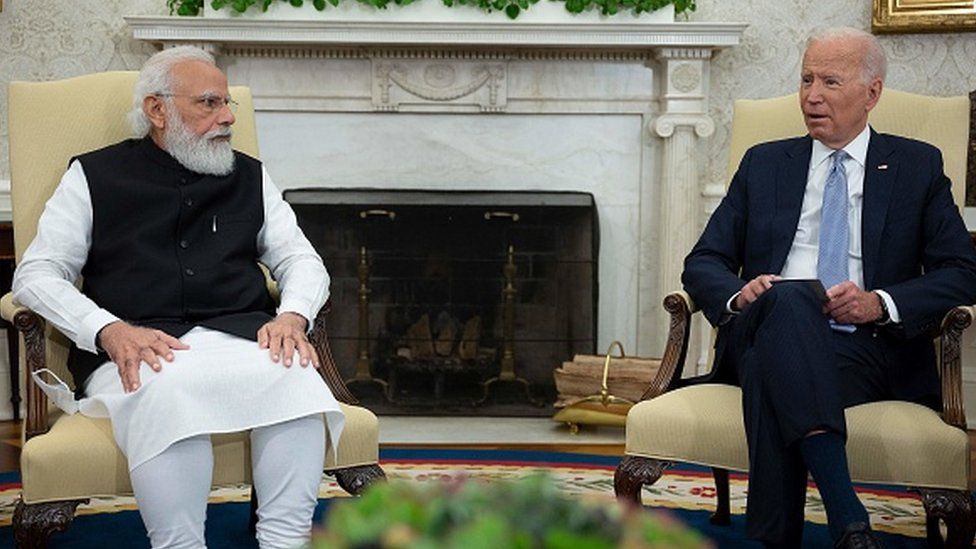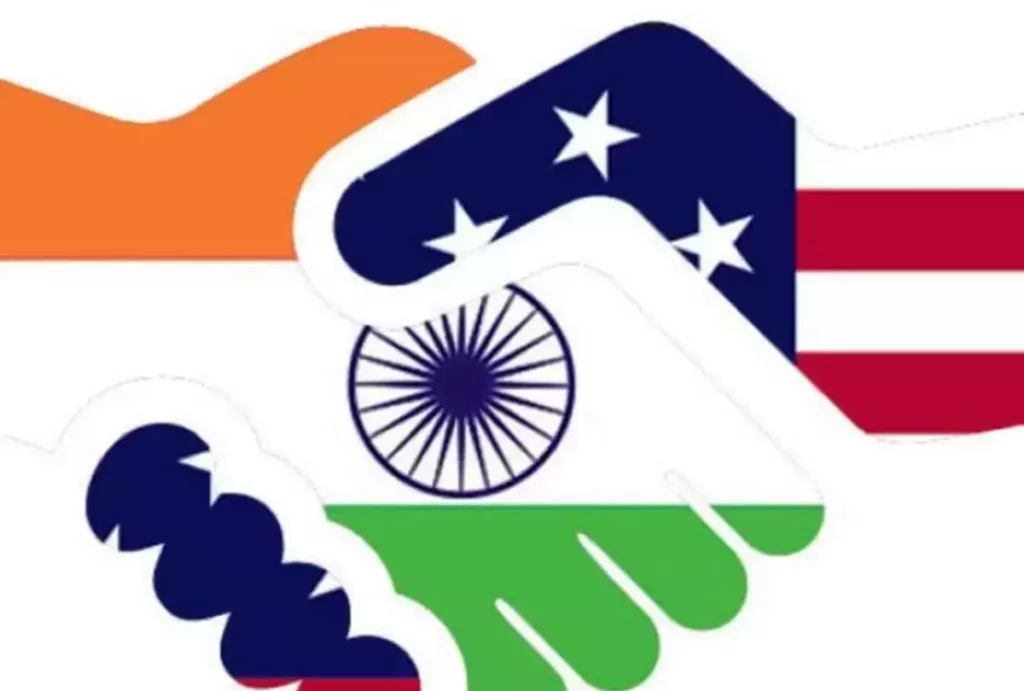Modi visit to US: Time to institutionalise bilateral relations

Indian PM Narendra Modi visits the US at the invitation of President Joe Biden and First Lady Jill Biden
On June 22, Indian Prime Minister Narendra Modi will begin his first State visit to the United States at the invitation of President Joe Biden and First Lady Jill Biden.
The White House says that the State visit, the highest level of diplomatic reception, will boost the US and India’s shared commitment to a free, open, prosperous and secure Indo-Pacific and “our shared resolve to elevate our strategic technology partnership”, including in defence, clean energy, and space.
Modi will also address a joint session of the US Congress, his second such address, after the first in 2016. Five other Indian Prime Ministers have addressed joint sessions of the Congress before him, namely Manmohan Singh, Atal Behari Vajpayee, P V Narasimha Rao, Rajiv Gandhi and Jawaharlal Nehru.
Modi’s visit to the US holds immense significance as it comes just before India will host the G20 Summit, in September and it is a unique opportunity for India to engage the United States in a constructive manner to ensure that the Summit in New Delhi is constructive and with some concrete outcomes that address the numerous challenges which the entire world is facing and where the G20 needs to act and be seen as acting.
For the US, too, the visit is of tremendous significance as it is yet another opportunity for the US to try to convince India to firmly cast its die in the favour of US and its NATO allies in the year-long stalemate with Russia in Ukraine.
Look at long-term
For Modi and for Biden their immediate goals are of course important. But it will be wise for both Modi and Biden to look beyond the short-term goals and use this occasion to shift the bilateral relationship between the two nations to a higher gear as the relationship is primed for it now.
Beyond the G20 Summit and the Russia-Ukraine war, there are other issues too. The new urgency in the US-India relationship signals an inevitable transformation of new paradigm resulting from changes in the internal structural and external equation of global environment. The Trans-Atlantic relation needs a fresh look as conditions have changed dramatically and on so many fronts, this visit of Modi will be therefore special in many diplomatic terms.
Also, the visit gives the two countries an opportunity to recognise that without the participation of Russia a peaceful world today is not possible. The challenge therefore for Biden and Modi will be to create a consultative mechanism of dealing jointly with new realities facing the world today.
By inviting Modi for state visit, Biden administration is playing a long game. Despite some existing challenges in bilateral ties, the Biden administration realises that the strategic importance of this relationship is India’s deepening commercial and defence ties with the US. The Biden administration thus will try to take the relationship, which has done relatively well across different administrations in both governments, forward and look for ways to bring it to a new level, both in terms of commercial relations and security relations.
In the last 16 months since Russia’s full-scale invasion of Ukraine, while Western democracies have vehemently condemned Moscow, the strategic silence maintained by India, as world’s biggest democracy, has confused many and has not been well understood by the US.
India’s concerns in this issue and its global ramifications, which have layers within layers, are very distinct from the West. Apart from four main factors shaping India’s policy toward Ukraine and Russia, namely history, energy, arms and influence, the most important concern for India is the way relations between China and Russia have evolved over the past year as Russian President Vladimir Putin has become extremely close to Chinese President Xi Jinping.
What is a major concern for India should also worry the West a lot and the western nations, especially the US, also need to recognise India’s military, location, public attitudes, development objectives, and threat perceptions are not like other US partners. That is why, America needs to carefully tailor its actions and expectations to build a meaningful strategic relationship with India.
The Partnership of 21st Century
The US realises the strategic, commercial and diplomatic importance of India, which is now the world’s most populous country, home to more than 1.4 billion people and the world’s fastest growing large economy.
And as tensions between US and China grow in commercial domain as well, it realises India’s potential as a promising alternative in supply chains, innovation hubs, and joint ventures. Already, India-US bilateral trade is on track to exceed last year’s record of USD 157 billion. This makes it as the most important potential geo-economic partner for the United States today with greater concern for national security and resilience.
To protect the US commercial interests and to expand its market in India, Biden is set to pressure India to further lower import tariffs, to remove barriers to foreign retail, to roll back unnecessarily restrictive data privacy rules, and to provide economic incentives for foreign investment. Modi will listen to it patiently but given that in the next few months, India will be in the election mode, it is unlikely that he will carry out any painful reforms or give in to any demands in the immediate future.
It is also almost certain that Biden will discuss the reforms in the United Nations, enlargement of G7, NATO and QUAD groupings, in bid to entice India to join these groupings and hence be firmly in the US camp. He may also raise the issue of Putin’s participation in Delhi Summit, with oblique signal for India to keep him out.
One of the biggest developments during the visit is likely to be in the domain of defence and notably US proactively helping India develop its defence manufacturing capabilities.
The US Secretary of Defense Lloyd J Austin travelled to India this month on June 4-5, to reinforce the major defence partnership, and advance cooperation in critical domains ahead of Modi’s visit. India and the United States have concluded a roadmap for defence industry cooperation for the next few years, to bolster New Delhi’s defence manufacturing ambitions. Austin has committed to strengthen operational collaboration across all military services, with an eye to supporting India’s leading role as a security provider in the Indo-Pacific.
Modi’s Game
Modi knows that America’s foreign policy is not based on liking or disliking but what benefits America and what is in its best interest. He also knows that American administration will not waste a minute to embrace the new leader in India should he lose the 2024 election.
It is unlikely that Biden will raise Kashmir issue with Modi but in fact it will be Modi who will use his address to the joint meeting of the House of Representatives and Senators to tell how by abrogating Article 370 he was able to quell the militancy and terrorism in the region, and how he has brought peace and prosperity in Kashmir. He might also mention the successful G20 Tourism Summit in the valley in May.
He will speak about terrorism propagated by Pakistan, and he might seek support from Congress and Senate for punishing Pakistan. He may also raise the issue of the status of Pakistan Occupied Kashmir (PoK), and the disputed areas of Gilgit and Baluchistan. So, stakes are high for Modi too and he will not shy away from taking a dig at those who criticise India for human rights violations.
India has the potential to achieve energy independence by 2047 with significant economic and environmental benefits. It has achieved the world’s lowest renewable energy prices and has found some of the world’s largest lithium reserves. This can propel India towards cost-effective energy independence in a way that is economically and environmentally advantageous. India’s energy infrastructure requires USD 3 trillion of investment in the coming decades, and US could be a major stakeholder in this.
Besides bilateral ties, both leaders also have domestic agenda on their minds. As the General Election in India is just a year away, Modi will certainly try to capitalise on the visit and would like to come back with unprecedented agreements and investments in commercial and defence domains.
Similarly, as he prepares for a re-run in 2024 Presidential elections, Biden will be keen not only to grab the votes of almost 5 million-strong Indian diaspora, which is also the richest ethnic group in the country, but also try to counter his potential rival former President Donald Trump by showing off some major economic and strategic wins during Modi visit.
Their individual agendas apart, the two leaders should look at the longer-term outcomes of the visit which is likely to be more of a ‘gear changer’ than ‘game changer’ in India-US ties and the relationship should now move ahead at fastest possible speed, greater trust and strengthened cooperation.
At a time when China has alienated most of its neighbours with its aggressive rhetoric and actions, and US-China relations locked in a stalemate, India has a unique opportunity to expand its influence in the Indo-Pacific to ensure a stable regional order.
It is therefore in Washington’s interest to reach out proactively to Modi and assure him that the future of US–India relations can look bright if the present is managed productively. PM Modi is the man best placed to turn the tide on the US–India bilateral front and Modi will be doing just that with his historic state visit to the US.
Sunil Prasad, is the Secretary General of Brussels based Europe India Chamber of Commerce and the views expressed here are his personal views.











